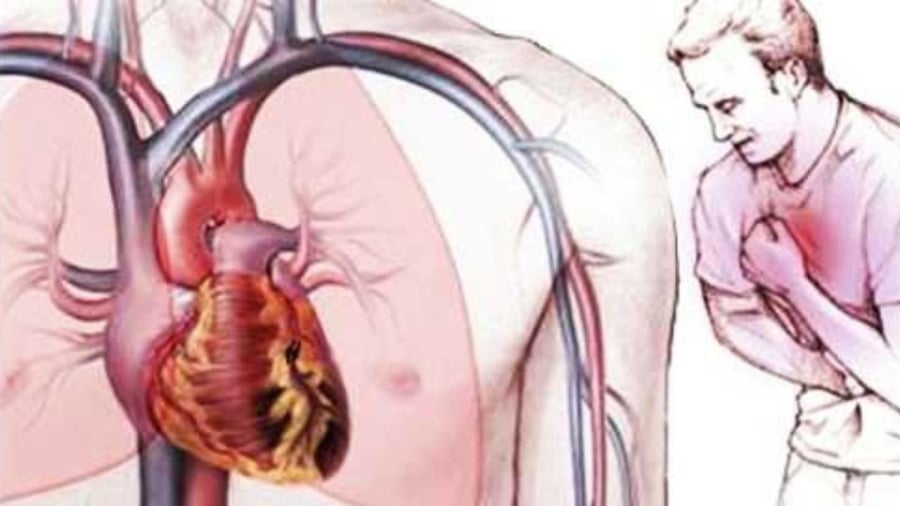Cancer is a formidable disease that can develop in almost any organ in the human body, from the lungs to the liver, intestines, and brain. However, there is one organ that is considered a “no-go zone” for cancer – the heart. Historically, very few people have heard of heart cancer, and in reality, the incidence of this disease is extremely rare. So, why is the heart almost “immune” to cancer? The following article will provide a detailed biological and medical explanation for this unique phenomenon.
1. Understanding the Origins of Cancer
To comprehend why the heart is rarely affected by cancer, it’s essential to grasp the nature of the disease. According to modern science, cancer occurs when cells in the body undergo genetic mutations during division, leading to uncontrolled growth and the formation of malignant tumors. Tissues with high cell division rates, such as the skin, liver, and intestines, are more susceptible to cancer due to the increased likelihood of DNA copying errors resulting in mutations.
For instance:
Skin cells renew themselves every 28 days.
The lining of the intestines is replaced within a few days.
Liver cells also have an impressive capacity for regeneration after injury.
This rapid regeneration is a double-edged sword – while it aids in healing, it also provides opportunities for DNA errors and increases the risk of cancer.

2. Cardiomyocytes Divide Very Slowly
In contrast to the aforementioned tissues, cardiomyocytes (heart muscle cells) rarely divide. Research indicates that a cardiomyocyte can survive for up to 20 years before dividing. With such a slow rate, the probability of errors occurring during DNA replication is negligible, making the formation of cancerous cells highly unlikely.
Consequently, primary cancer originating in the heart has almost no “chance” of developing.
3. The Heart’s Unique Environment: Unconducive for Cancerous Growth
It’s not just the slow division of cardiomyocytes that makes the heart resistant to cancer, but also the intrinsic environment within it. The heart and blood vessels form a closed circulatory system, limiting exposure to toxic substances from the external environment.
Additionally, the high blood flow rate through the heart makes it challenging for any mutated cells to persist in the cardiac chambers. The high pressure and oxygen-rich environment in the heart create a biologically harsh setting, triggering stringent DNA protection and repair mechanisms.
These factors collectively contribute to the heart’s inherent “immunity” against cancer.
4. While Rare, Heart Cancer Does Exist
Although exceedingly rare, heart cancer can occur, predominantly in two forms:
Primary cardiac tumor: This extremely rare form accounts for only 0.0017% to 0.028% of cases and originates from the heart’s own cells.
Secondary cardiac tumor: More common, this occurs when cancer cells from other sites (such as the lungs, breasts, or liver) spread to the heart through the bloodstream.
Notable cases, such as designer Virgil Abloh (who passed away from cardiac angiosarcoma in 2021) and Kiss drummer Eric Carr (who died in 1991 from heart cancer), have brought attention to this seemingly “mythical” disease.
5. Benign Tumors in the Heart Require Caution
Not all tumors in the heart are cancerous. Myxoma, a benign tumor, is the most common type found in the heart. While not cancerous, it can still cause serious complications if it obstructs blood flow or disrupts heart rhythm.
Therefore, any abnormal signs or symptoms related to cardiovascular health should not be ignored, even though the risk of heart cancer is low.
6. Heart Cancer Symptoms Are Often Vague
Given its rarity and diagnostic challenges, the symptoms of heart cancer are typically nonspecific:
Prolonged fatigue
Shortness of breath, chest discomfort
Dizziness, palpitations
Fainting spells
If you experience these symptoms, especially if you have underlying cardiovascular issues, it’s advisable to seek medical attention to rule out any serious conditions.
The heart can be likened to a “biological fortress,” naturally defending against cancerous attacks. Its slow cell division rate, unique high-pressure and oxygen-rich environment, and closed circulatory system combine to provide near-absolute protection against genetic mutations.
However, this doesn’t mean one should neglect cardiovascular health. While the likelihood of heart cancer is exceptionally low, other cardiovascular diseases such as heart failure, myocardial infarction, and arrhythmias remain significant threats. Adopting a healthy lifestyle, controlling blood pressure, maintaining a balanced diet, and undergoing regular health check-ups are the best ways to safeguard your precious heart.
The Magic of Salt: Uncover the Simple Daily Habit to Manage Your Blood Pressure
Most people believe that reducing salt intake is the only way to control blood pressure, but new research suggests that increasing your dietary potassium can be even more effective. Bananas, broccoli, and other familiar foods become your ‘secret weapon’ in the fight against heart attacks and strokes.





































